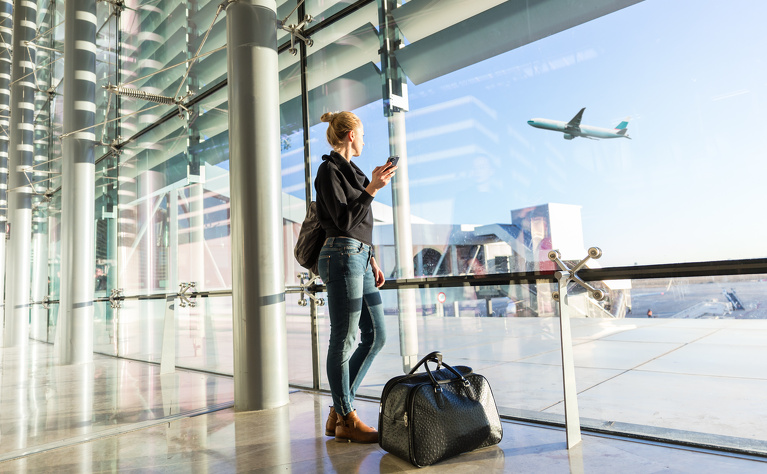
Flying with Crohn’s disease or ulcerative colitis can seem daunting. But, with a little preparation you shouldn’t have to miss out.
In order to fly, even if it is just a domestic flight, you will need to go through airport security. Here they will check that you aren’t carrying anything dangerous or illegal onto your plane. Both your hand luggage bags and you will be checked.
If you are carrying medication in your hand baggage then you should make sure it is in the original packaging with the Patient Information Leaflet. It is also advised to carry your prescription with you and a letter from your doctor explaining what the medication is, why you need it and your dosage. Before flying you should check that none of the active ingredients in the medicines are illegal in your destination country (including over the counter medication).
If you have injectable or liquid medications, or other medical devices, then you should be able to carry these onto the flight if you have letters from your doctor and your prescription. You should also speak to your airline at least 48 hours ahead of your trip to let them you what you are bringing with you.
Read more about travelling with medications.
As your bags are being checked you will be required to be scanned by airport security. This is usually done via a machine you walk through or a hand held wand, however some airports now use scanners which you stand in and sweep 360 degrees around you. If you set the machine off then you may need to be manually scanned or searched. Often, it is metal on items of clothing or jewellery that cause this, however it has also been known for stoma appliances to be flagged. If this happens, it is up to you if you want to tell the security guard about your stoma, although they may discover it during a manual search anyway. To help you could request a ‘stoma passport’ from the company that supplies your stoma equipment. These ‘passports’ explain what a stoma is and the supplies that you need. They are often available in several languages.
Many airports in the UK now operate a hidden disability scheme (such as the sunflower scheme in the UK) where you are given a sunflower lanyard. This helps staff around the airport to recognise that you have a hidden disability, such as Crohn’s disease or ulcerative colitis, for which you may need additional support. These are available to pick up from the guest assistant desks at airports or at the entrance to the immigration UK Border Force area. Some airports will also post these lanyards to you ahead of your trip.
There are similar schemes operated by some airports outside of the UK. To find out if an airport you are visiting has one then visit their website or call them.
Toilets
If you would be more comfortable sitting close to toilets during the flight then you should speak to your airline ahead of your trip to see if they can make special arrangements for you. On many flights you are also able to book your seats in advance (for a fee!). Doing this will ensure that you get a seat you are happy with. If you aren't able to organise this ahead of your flight then you could try talking to one of the staff on-board to see if they can help you to be seated near a toilet.
Toilets on planes can be very small and cramped. If you have a stoma it may be worth practising changing your bag in a small space before you fly in case you need to do so during your journey.
Cabin pressure
You may have heard stories about the effects that high altitudes can have on Crohn’s disease, ulcerative colitis or stomas. And, it’s true that for some people (including those without IBD) a change in cabin pressure can cause gas and/or bloating. To try to minimise this you should avoid drinking fizzy drinks or eating anything which you know causes you to become more gassy.
If you have a stoma which has a filter this will help any excess air to escape (and also hide odours). You can get appliances with filters from your stoma company. Carrying spare clothing and stoma supplies can also help you to relax.
DVT
On any length of flight you should make sure that you move around regularly. Flying causes an increased risk of developing deep vein thrombosis (DVT) or blood clots - particularly in flights over eight hours long. Having Crohn’s disease or ulcerative colitis can put you at a three times greater risk of developing DVT than the general population, with flares creating an even further risk1. Recent abdominal surgery can also place you at a greater risk of developing DVT2.
Some things you can do to help include wearing flight socks or compression stockings, regularly walking around and doing gentle exercises throughout your journey.
In flight food
If you are provided with an inflight meal then you may want to get in touch with your airline before travelling to let them know about any dietary requirements you have, otherwise you may want to take food for the flight with you.
You can find out more information about travelling with IBD on the IBD Passport website.